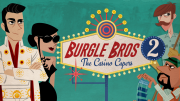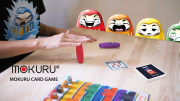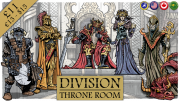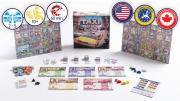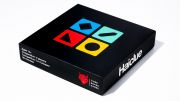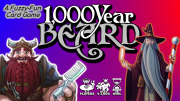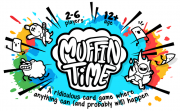Burgle Bros 2: The Casino Capers (Fowers Games) – A sequel to the cooperative heisting game, in Burgle Bros 2 players are stealing from casinos. On your turn you get four actions to move around the board, avoid guards, and peek at adjacent rooms. Guards move at the end of each turn, moving towards specific rooms on the board as determined by a deck of cards. The goal of the game is to find the safes, crack them, and steal the loot from inside. Differences in the game to its predecessor include the following: rather than item cards, each player has three special abilities that unlock as the game progresses, there are new rooms with special effects, and if players take too long bouncers join the guards in hunting them. Also, once you have cracked the safes, a special finale is triggered before players can escape. Each time you successfully complete a finale, you open a new sealed scenario which introduces new elements into the game.
Casual Games on Kickstarter: Burglaries and Desk Toy Tricks

This month brings the sequel to a popular cooperative game to Kickstarter, a dexterity game about performing tricks with desk toys, and a game that finally answers the question: what happens to Chess pieces after they come home from the battle?
Mokuru Card Game (Jean Francois Rochas) – At the center of Mokuru Card Game is a desk toy, a small rounded stick shaped object that can be used to perform various tricks. During the game players draw cards from the main deck. Each card shows a flipping trick that can be performed with the Mokuru toy. On your turn you play one of these cards and attempt to perform the trick shown on it. If you succeed, you earn a point. When you reach eight points, you draw from the master trick deck. In order to win the game you must complete a master trick.
Division: Throne Room (MAD Games) – Each courtier character card is based on pieces from Chess: pawn, bishop, rook, and so forth. You set up the game by shuffling the courtier cards and placing them in a three by three grid. In a two player game, you deal each player four palace cards. Each palace card has a requirement for the layout of the courtier cards; to complete a palace card you must manipulate the grid so that it matches the card. On your turn you roll two dice and choose one of the courtiers indicated by the dice to move. If you complete a palace card, you discard it. The first player to complete all their palace cards wins the game. In a solo game, you move both courtiers that correspond to your dice roll, each turn. Your goal is to complete each palace card in a certain number of turns or it is placed in an enemy pile. When the last palace card is resolved you win the game if you completed more of them than were placed in the enemy pile.
Taxi Derby (Skipshot Games) – Taxi Derby is a pickup and deliver game in which players are taxi drivers, competing to have the most money by the end. Rather than a limit on the number of spaces you can move, players may move their car four spaces and remain in the speed limit, but may choose to speed and move extra spaces, though this will increase the chances of being caught by the cops and being given a ticket (tickets might be warnings, fines, or even suspending your license for a short amount of time). If you don't speed, you get to move the cop car in any direction you choose, perhaps even towards your opponents. When your cab is empty, you may spend money to purchase upgrades at the store location. Different passengers will pay more if your cab has different upgrades or might need you to meet different requirements. Players can earn bonuses at the end of the game for carrying multiple passengers of a matching type.
Haiclue (Tiger Board Games) – There are four words in the center of the table. The active player draws a card to determine which word is his. The active player will have fifteen random word tiles. He may use any of these as clues. The other players then read the clue words aloud, and each of them guesses which word in the center of the table they believe is the active player's. Each player that guesses correctly earns a point, and the active player earns one point for each player who correctly guessed as well.
1,000 Year Beard (D.D.O'Brien) – Each player starts the game with a card showing their dwarf's face and their own deck of cards, from which they draw a starting hand of five. There are three types of cards: beard cards, grooming cards, and silver coin cards. On your turn you may perform the following three actions in any order: grow, groom, or pluck. Grooming allows you to add a beard card to your dwarf's beard. Beard cards are numbered 50 to 200 and must be played in sequential-descending order. Plucking has you discarding one card from your hand and drawing a new card (you may do this twice), and grooming allows you to play a grooming card. Grooming cards have special abilities and cost silver in order to play them.
Muffin Time (Big Potato Games) – You win the game by having exactly ten cards in your hand at the start of your turn. Each player starts the game with three cards. On your turn you can draw a new card or play an action card. Some action cards will get you more cards or force other players to lose cards. There are additional abilities action cards can have, such as forcing two players to have a rock-paper-scissors duel, or preventing you from winning as long as it’s in your hand. You can also play a trap card which is kept hidden until a special event occurs, while counter cards can reverse affects or prevent action cards from occurring.
Disclosure: unless otherwise noted, we have not seen or played any of the above games. Our assessment of each is based on the information given on the crowdfunding project page.




